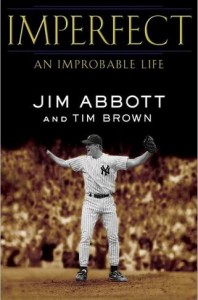Over the past six plus years I delved deeper into a word which can stir controversy amongst the disability community, “inspiration.” Prior to the past six years I probably like most people did not give much thought to the concept. I found wrestler Tommy Dreamer inspirational for his loyalty to Extreme Championship Wrestling. Additionally I found Cleveland Indians pitcher Charles Nagy inspirational for fighting his way back to the Majors after bone chips in his pitching arm’s elbow sidelined him during the 2000 season.
What started the deeper exploration six years ago? My college professor Sister Karita telling me “Zach, you are an inspiration to anyone who has to overcome adversity.” I never considered myself an inspiration before. No, I just do what I need to do to get through each day.
However Sister Karita’s comment weighed on me. In fact they helped me decide to pen my teen memoir Off Balanced. If Sister Karita could find inspiration from my story, maybe others could too.
A few years later I published Off Balanced (buy for your Kindle or Nook) and yes, inspiration remained among the words readers used to describe the book. Interestingly enough publishing Off Balanced led me to write more about disabilities. Doing so introduced me to individuals in the disability community who rejected the praise “You’re an inspiration.”
Seems funny, right? There exist so many more worst descriptive words to object. Yet a closer look reveals valid points. Foremost, what criteria led the speaking party to utilize the I-word? If the reason entails simply living with a disability that will typically sit wrong with the “inspirational” person.
Why so? Consider the implications. Alternatives to inspiring by just living mean sulking over limitations or taking drastic life-ending action. Should the metaphorical bar for achievement in the disability community stand at smiling and possessing a will to live? I say no.
Honestly I felt hesitant typing “disability community” in the above paragraph because this topic transcends the disability community to multiple demographics. The catalyst for today’s post provides evidence, a conversation with my recently departed Aunt Ellen. My aunt died indirectly from cancer last month. I share her story in the video below.
Back in January when I went to Arizona to visit Aunt Ellen we ended up enjoying a conversation about inspiration. Said conversation went something like this.
Me: I think you’re inspirational.
Aunt Ellen: My friend said the same thing but I don’t get why.
Me: To me it’s because you are not letting the cancer and grim prognosis change your personality.
Aunt Ellen: I’m just doing what I can.
During the conversation Aunt Ellen also told me she considers me an inspiration to which I replied similarly “I just do what I need to do.” Reflecting back 10 months later I see a theme. Inspiration remains a third person concept. We see inspirations in others but we do not in ourselves.
Do you agree? Sound off in the comments section below!
P.S. If enjoyed today’s post, you may also like my video “Calling Someone with a Disability ‘Inspirational.'”







